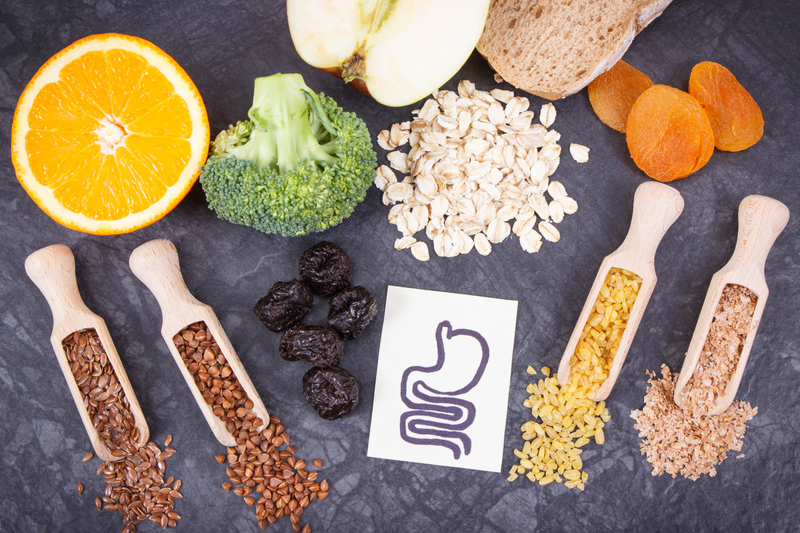When you think of preventative health measures, what comes to mind? Some of the obvious ones are routine doctor visits, regular exercise, good sleep and quality nutrition, but you may not know that gut health is also a major preventative health measure. This is where we will focus our attention today.
The gut plays a major role in how our bodies function. A healthy gut equals healthy overall well-being. Sleeping adequately, exercising regularly and taking antibiotics only when necessary are common ways to keep your gut happy. However, the best way to maintain a happy and healthy gut is through eating the right foods.
Why is your gut so important?
Your gut houses over 100 trillion bacteria known as “good” bacteria. (They help your metabolism and overall health.) These bacteria feed on dietary fiber, and the breakdown results in beneficial, anti-inflammatory fatty acids that give you energy and fight inflammation.
About 70% of the immune system is also housed in the gut. When you aren’t feeling great, or when your immune system is weak, the cause can often be traced back to the gut. This is a sign there is too much bad bacteria — or not enough good bacteria — in your stomach. By simply eating the right foods and limiting the junk, you can bring balance back to your gut, enhance your immune system and feel better.
What foods should you eat to promote optimal gut health?
The first part of this answer is simple: Avoid or limit highly processed junk foods, fried foods or foods that contain a high amount of refined sugar. You likely have a general idea of what these foods are and know that the less you consume, the better you will feel. You should instead consume a variety of whole, unprocessed foods.
At least five servings of whole fruits and vegetables per day is a great starting point. Fruits and vegetables are high in nutrients and fiber, which feed good gut bacteria. More specifically, prebiotic and probiotic foods provide excellent health properties for your gut.
Prebiotics are the foods that help feed the good bacteria and create a healthy environment in your gut for good bacteria to thrive. Probiotics are foods that contain the good bacteria. The International Scientific Association of Probiotics and Prebiotics (ISAPP) suggest eating 5 to 15 grams of prebiotics per day. More research is needed to determine the amount of probiotics suggested per day. In general, if you are eating a healthy amount of prebiotics daily, which includes high-quality natural fiber sources, then you’ll have less of a need to consume probiotics. But consuming at least one serving of natural probiotics a few times per week is a good practice.
Prebiotic foods:
- Garlic
- Onions
- Asparagus
- Bananas
- Barley
- Oats
- Apples
- Cocoa
- Flaxseeds
- Wheat bran
Probiotic foods:
- Cottage cheese
- Kimchi
- Sauerkraut
- Yogurt
- Miso
- Pickles
- Kombucha
- Apple cider vinegar
- Tempeh
- Parmesan cheese
What are some things to consider when it comes to your gut health?
1. Only take antibiotics when needed. Taking them too often or for every common cold can kill all types of bacteria, including the good kinds in your stomach. Remember, 70% of the immune system is housed in the stomach. When you are prescribed an antibiotic for an infection, some research suggests eating more probiotic foods to keep the level of good bacteria plentiful. Good bacteria equals a happy gut and a healthy you.
2. Eating the right amount of prebiotics and probiotics can help keep your immune system strong. Eat them regularly to keep yourself healthy while you travel this summer.
3. Prebiotic and probiotic foods can also help keep the body feeling good during periods of stress or when you’re feeling overwhelmed. According to the Cleveland Clinic, “Stress decreases the body’s lymphocytes — the white blood cells that help fight off infection.” Eating foods high in natural prebiotics and probiotics can positively affect your body’s ability to handle its response to stress.
4. Always consult your doctor. Keep them in the loop about your diet habits and any gastrointestinal (GI) symptoms you have during your annual physicals. They will be able to best counsel you on your next course of actions as well as refer you to a specialist, if needed.
Healthy eating plays a vital role in your longevity and well-being. Try adding the above foods to your healthy diet regimen, and allow your gut to be one of your best preventative health measures.

